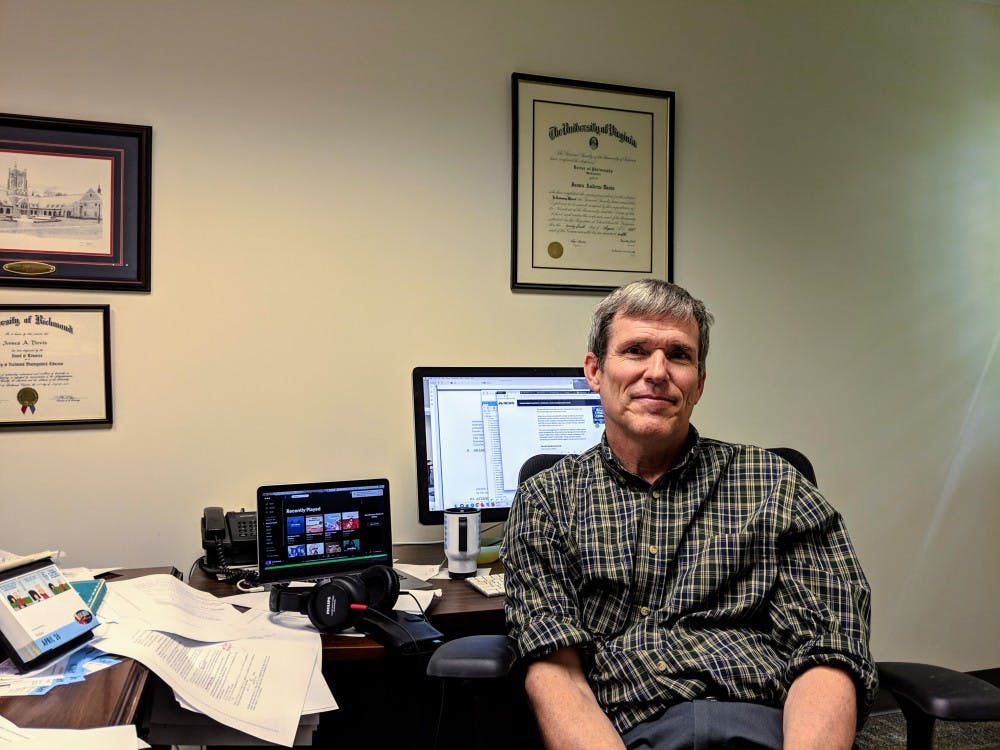University of Richmond mathematics professor James Davis was awarded a $25,000 grant from the National Science Foundation to help fund travel expenses for attendees of this year’s International Conference on Finite Fields and their Applications, a biennial academic conference being held in June in Vancouver, Canada.
The conference, which takes place every other year at a new location, deals with finite fields, an area of mathematics that is particularly relevant to online activities such as messaging, password security, banking and video streaming.
At its core, a finite field is a set of numbers that has a limit on the amount of numbers in the set, usually a prime number or a power of a prime number, Davis said. Where this idea applies to online activity is in how computers work on a basic level.
“Most people would be familiar with the idea that computers operate with zeros and ones,” Davis said. “And that’s also true when you hit the send button to send your credit card. Your credit card isn’t zeros and ones, but the computer turns it into zeros and ones and transmits that.”
The computer groups these zeros and ones into bytes, groups of eight of these zeros and ones which together represent a unit of information like a letter or number, Davis explained. This group of eight in each byte would be considered a finite field.
Finite fields are a relatively new and uncharted territory in mathematics. Because there was not any need for it before computers became mainstream, there are still advancements in the field being made today, Davis said.
The conference covers several topics relating to finite fields: theory, computation and applications.
This year, Davis is serving as the program chair for a committee that oversees the conference. The committee is responsible for inviting speakers, organizing a schedule and putting together a book of articles written by speakers at the conference.
Davis was also responsible for securing the $25,000 grant from the NSF, a government organization that provides funding for research and education in most fields of science and engineering.
The grant will go towards helping academics who are just starting their careers, as well as women and other minorities in math and science fields, to attend the conference, Davis said.
“The NSF has a big push to try to encourage people from what are called underrepresented groups to have ways to go to these conferences and learn from the people who are the experts,” Davis said. “The money I got from the NSF can only be used, even though the conference is in Canada, to help pay for their flight, or their hotel.”
Davis said that the conference is looking for people from these particular groups because they often have not had the opportunity to get money on their own to travel abroad to conferences like this one.
Enjoy what you're reading?
Signup for our newsletter
“They’re interested in trying to get help so they can go back to their department and say ‘Listen, they’ve given me $1,000 and I need another $800,’” Davis said. “And that’s easier than going to your department and saying ‘I need $1,800.’”
To get the grant, Davis had to submit a proposal outlining why the finite fields conference was important and how it advanced the field of mathematics, he said.
The NSF accepts roughly a quarter of all proposed grants, a representative from the organization said in a phone interview. According to the foundation’s website, it receives approximately 40,000 grant proposals per year.
Davis has received numerous other grants and awards during his career, including a Fulbright Global Scholar award, several National Security Agency grants and the University of Richmond Outstanding Mentor award. He also has 15 granted patents in his name.
However, one would never know about his many accomplishments just by speaking with Davis, said senior Jackie Palmeri, one of Davis’ students and a double major in mathematics and computer science.
“Dr. Davis is one of the most intelligent yet humble professors I’ve had a class with at UR,” Palmeri said. “He’s not one to boast about his numerous accomplishments because it’s clear that his main focus is advancing his students’ academic careers.”
Contact contributor Andy Erickson at andrew.erickson@richmond.edu.
Support independent student media
You can make a tax-deductible donation by clicking the button below, which takes you to our secure PayPal account. The page is set up to receive contributions in whatever amount you designate. We look forward to using the money we raise to further our mission of providing honest and accurate information to students, faculty, staff, alumni and others in the general public.
Donate Now



